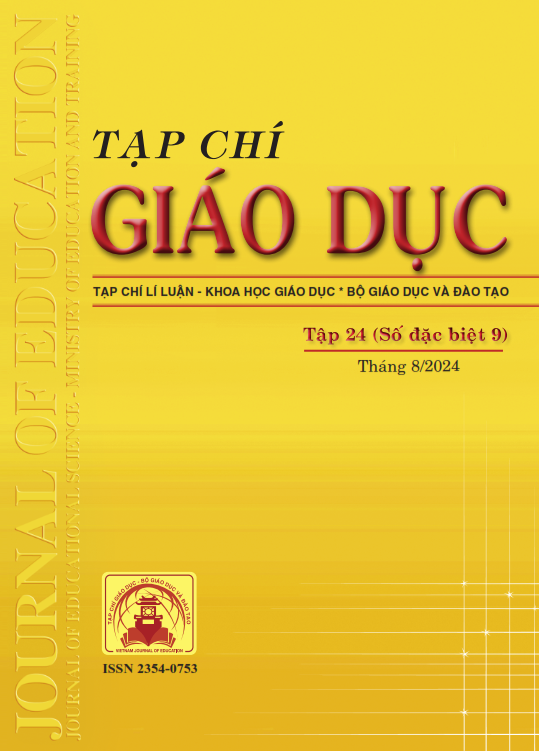Sự tương tác giữa các yếu tố trong mô hình Giáo dục 5.0
Tóm tắt
In the context of the rapid development of technology and the explosion of information, the education system is facing new challenges. Responding to this trend, the concept of “Education 5.0” has emerged as a reflection of transformation and progress in the field of education. This study uses conceptual analysis and mapping to explore the relationships between elements in the Education 5.0 model. Data were collected from diverse sources including surveys, interviews, and profile data. The results of the study show that there is a complex interaction between factors in the Education 5.0 model. Detailed analysis showed the significant influence of each factor on the learning experience and development of students. The study also conducted discussions focusing on the interpretation and interpretation of the results of the study, especially on the meaning and consequences of the interaction between factors in the Education 5.0 model and proposed some specific measures to improve the interaction between elements in the Education 5.0 model. This proposal can contribute to improving the performance and quality of the education system, thereby creating a more suitable and interesting learning environment for students and the lifelong learning needs of the community.
Tài liệu tham khảo
Alharbi, A. M. (2023). Implementation of Education 5.0 in developed and developing countries: A comparative study. Creative Education, 14(5), 914-942.
Babu, B. (2024). Education 5.0: An overview. Advances in Technological Innovations in Higher Education, 168-243.
Lantada, A. D. (2020). Engineering education 5.0: Continuously evolving engineering education. International Journal of Engineering Education, 36(6), 1814-1832.
Mytra, P., Wardawaty, A., & Kusnadi, R. (2021). Society 5.0 in education: Higher order thinking skills. BIS-HSS 2020 “Proceedings of the 2nd Borobudur International Symposium on Humanities and Social Sciences”. BIS-HSS 2020, 18, November, 2020. Magelang, Central Java, Indonesia.
Nguyễn Phúc Quân (2023). Nguồn nhân lực số trong phát triển kinh tế số tại Việt Nam: thách thức và cơ hội. Kỉ yếu “Hội thảo quốc gia đẩy mạnh ứng dụng khoa học dữ liệu để phát triển kinh tế số Việt Nam”, tr 354-365.
Rane, N., Choudhary, S., & Rane, J. (2023). Education 4.0 and 5.0: Integrating Artificial Intelligence (AI) for personalized and adaptive learning. Available at SSRN 4638365.
Rusman, A., Mas’udi, M., Hermoyo, R. P., Yarno, Y., Yunianti, S., & Rafsanjani, H. (2023). Education transformation in 5.0 society development era. AIP Conference Proceedings.
Skitsko, V., & Osypova, O. (2022). Education 5.0 maturity index: concept and prospects for development. International Conference on Electronic Governance with Emerging Technologies.
Sudibjo, N., Idawati, L., & Harsanti, H. R. (2019). Characteristics of Learning in the Era of Industry 4.0 and Society 5.0. International Conference on Education Technology (ICoET 2019).
Supriya, Y., Bhulakshmi, D., Bhattacharya, S., Gadekallu, T. R., Vyas, P., Kaluri, R., Sumathy, S., Koppu, S., Brown, D. J., & Mahmud, M. (2024). Industry 5.0 in Smart Education: Concepts, Applications, Challenges, Opportunities, and Future Directions. IEEE Access.
Usmaedi, U. (2021). Education curriculum for society 5.0 in the next decade. Jurnal Pendidikan Dasar Setiabudhi, 4(2), 63-79.
Tải xuống
Đã Xuất bản
Cách trích dẫn
Số
Chuyên mục
Giấy phép

Tác phẩm này được cấp phép theo Ghi nhận tác giả của Creative Commons Giấy phép quốc tế 4.0 .












